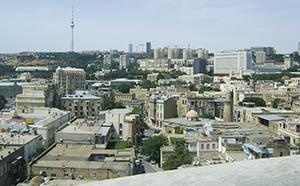
As 2015 came to a close, I found myself in Baku, Azerbaijan, because I wanted to better understand and appreciate the country’s friendship with Israel and the United States.
Thinking about food for Shabbat, I ventured out for a walk and found an indoor farm-to-table grocery store on one of the quaint and quiet residential streets in a notably religious-Muslim neighborhood of the city — in a metropolis and a country boasting a 95 percent Muslim majority population. Like any other day, I was dressed in clothing that obviously identified me as a Jew.
I suppose it might take first-hand experience to appreciate the intense contrast; how in that specific district of Baku, concern for my security never came to mind. The anxiety I felt in Jerusalem only the week prior, a practical fear over what is happening on the streets of Israel nearly every day, was totally and noticeably absent. Many strangers smiled, and a few even said Shalom to me.
Situated around lulling, picturesque architecture and trees, this part of the city is a mix of the beautifully old and practically new, akin to the Nachlaot neighborhood of Jerusalem. Like Nachlaot, the religious Muslim neighborhood in Baku felt safe and protected, perhaps especially because it is religious, and religion is supposed to be good, and supportive of goodness toward others. Unlike Nachlaot, Baku doesn’t require the built-in protection of undriveable alleyways, a token of security against the threat of terrorist car rammings in Israel.
Baku is the capital of a rare, promising nation, known as the global champion of healthy cultural and religious diversity, for which it is celebrated by its citizens of many faiths. Some in the media suggest that Azerbaijan is only so tolerant because it is secular. However, this is a shallow interpretation of something very deep and actually very old. The success of multifaith tolerance in Azerbaijan is not due to an absence of religion. Religious life in Azerbaijan is vibrant and visible, with proud congregations and enviable buildings for every religion and faith. Ironically, it’s easy to understand how this majority Muslim, moderately traditional, family-oriented society connects so well with Jewish and Christian neighbors. The permeating values of faith, respect and kindness surpass any boundaries between the various faiths, and promote inclusivity and mutual appreciation.
Like any diverse Jewish community in the United States, the 30,000 Jews of Azerbaijan are uniquely cloistered and represented—Ashkenazi, Sephardic, Hasidic, with the addition of the Azerbaijani-based Mountain Jews — a 2,000-year-old community. All share the normal angsts: hopes to expand, reach more people and keep the youth engaged with their Judaism into adulthood. Unlike in America, anti-Semitism is a problem they never have to deal with. This particular sentiment was explicitly and repeatedly expressed by various rabbis, community leaders and many students I spent time with in Baku, as well as in Red Town, the all-Jewish town in the Quba region, just a two-hour drive to the north from the capital.
The Jews of Azerbaijan appreciate that they live in this country, protected and respected, unlike most nations today, including the United States, with very active, anti-Jewish voices and movements. Spending several Shabbats in Jerusalem in the following weeks, I considered the risks of being there, of shopping in the open market where so many have been mercilessly attacked with knives, cars and even bombs. I missed Baku and in some way wished I could switch out the scenes, and replace the dread of stabbings in Jerusalem with the peace of mind I felt wandering around that day in the most religious-Muslim neighborhood of Baku, just hours before Shabbat.
Whether in Jerusalem or Los Angeles, interreligious harmony and positive multiculturalism must be studied and shared, in schools, neighborhoods and the global media. The Republic of Azerbaijan may be rich in allies, oil and history, but its greatest natural resource is the national value of acceptance and respect, tangible principles capable of immunizing entire nations against intolerance and hatred.
If many more communities and leaders were to study and visit Azerbaijan, and see what I have seen, it’s impressive to imagine how fast the belief and inspirational force for interreligious unity would take hold, popularizing a peace that can be examined, championed and defended.
By Israel Barouk /The Algemeiner









